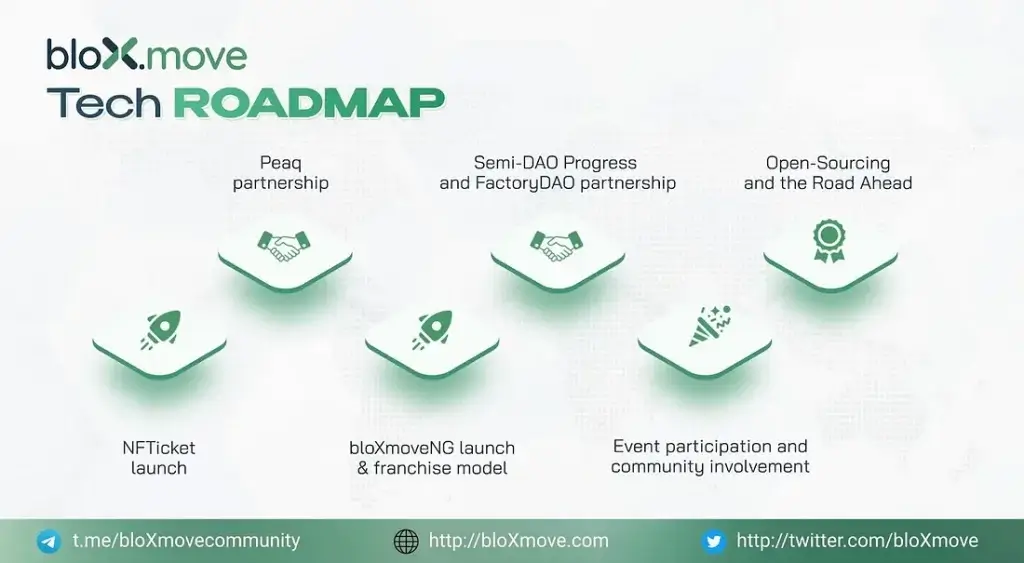
A few days ago, we launched our brand new #NFTicket solution. Since the launch 5 days ago, more than 2,000 NFTickets have been minted. First things first: Thank you for exploring the travel voucher journey and testing our demonstrator. Our launch article gave you more background information about the technology, the protocol and the development history of the bloXmove #NFTicket.
NFTicket has been designed to realize the following five functionalities, each with their own set of application and use cases.
- Vouchers
- Coupons
- Tickets
- Collections and memberships
- Certificates of ownership, e.g., Renewable Energy Certificates or certifications e.g., Academic Proof

In this article we provide an in-depth overview of the first three of the features, NFTicket supports.
1 — Voucher
Vouchers are simple credentials which state the following:
I, the issuer of this voucher, will pay out the value of this voucher to any service provider willing to accept the voucher as payment for services delivered.
As such they are cashless certificates of value, which are backed by the issuer and his guarantee of paying the value of the voucher in real cash to whoever redeems it.
So mainly a NFTicket voucher represents stored value: e.g. x units of ERC20 token, e.g. 10 USDC or 20 BLXM.
Customers use case: service provider A, the airline in our live demonstrator, issues the vouchers to their customers. The voucher can be linked to the boarding pass for example in a case of a flight delay. The customer can redeem the one-time-voucher at any accredited partner in the airport and exchange the voucher, e.g. into a “café-late”.
The coffee shop which redeems the voucher is now now owed the value of the voucher by the issuer, i.e., the airline.
Logic encapsulated by:
Issuer: NFTicket issued by “Issuer”, e.g., Air Lusitania
Reseller: Sold by “Reseller”, e.g., bloXmove can be the reseller for all airlines in Portucalia Airport.
Service Descriptor: all services using NFTickets have a unique service descriptor which references the company ID as well as a service identifier identifying the specific service(s) covered by the voucher. This service descriptor can be used to synchronise with off-chain service and product backends.
2 — Coupons
A coupon is a voucher that can be used several times. Coupons and all other non-voucher tickets use ‘credits’ to calculate service level granted and provided.
Compared with NFTicket vouchers, NFTicket coupons have the following additional fields:
- Credits
- Price per Credit
- ERC20 token: which token price per credit is calculated in
Services are denominated in credits, e.g., one night Stuttgart, class medium costs 3 credits, one night Paris, dingy dump costs 13 credits etc.
The purpose is to separate relative pricing from financial pricing.
By connecting credits to the actual price by way of ‘price Per Credit’, credit-based pricing can be kept stable while adjusting for inflation by increasing price per credit.
Customer use case: coupon provider B can offer an NFTicket coupon and charge it with a certain number of credits representing a fixed amount of money — now the customer can use it like a pre-paid card which is connected to its user ID in a unique way. It is an easy way to offer for example a mobility budget which can be used to pay for tickets across multiple operators, e.g. e-scooter, bus and taxi.
3 — Tickets
This is actually the core use case which drove us to design the NFTicket protocol.
bloXmove needed a protocol — a networked software engine — which would handle the core processes of rental and charging.
The nature of such services can be abstracted to the following steps:
- Verify credentials of the user: mainly his ability to pay but in some cases also driver license.
- Agree on terms of conditions of service to be delivered: offer & accept.
- Check-in: Start the service in a verifiable way.
- Deliver service and collect proof of service delivered, e.g. distance driven or time rented.
- Check-out: End of service. Present user with an invoice and trigger payment to service provider.
These five steps are complete, i.e. once they are handled, any and all rental service can be processed. Do note that the same model applies to hotel or container rentals. In fact, Step 4 is only needed for variable-length rentals.
Sport or music events are checkin-only events, so check-in and check-out are handled at the same time (of presenting the NFTicket).
This use case actually represnets bloXmove’s core business: we are applying it both to
- our launch of a “Decentralized Uber” in Nigeria as well as having used it as well as to
- the core transaction platform within M4ALL, Mobility for all: our joint collaboration with the Blockchain Competence Center Mittweida, the German Ministry of Education and Research as well as mocci, a maker of electric bikes.
Appetite to apply the bloXmove #NFTicket to your businesses? We showed you: the potential of real-life utility is huge. Let’s jointly figure out the opportunities and technial advantages for your and/or your company. Mail to: team@bloxmove.com

